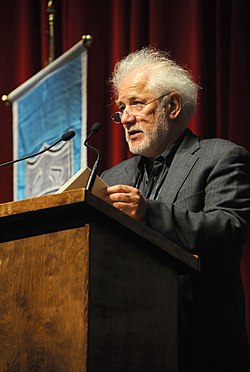Michael Ondaatje Quote
That's Anil's path. She grows up in Sri Lanka, goes and gets educated abroad, and through fate or chance gets brought back by the Human Rights Commission to investigate war crimes.
Michael Ondaatje
That's Anil's path. She grows up in Sri Lanka, goes and gets educated abroad, and through fate or chance gets brought back by the Human Rights Commission to investigate war crimes.
Tags:
war
Related Quotes
Let my silence grow with noise as pregnant mothers grow with life. Let my silence permeate these walls as sunlight permeates a home. Let the silence rise from unwatered graves and craters left by bomb...
Kamand Kojouri
Tags:
abuse, abused, activism, activism poems, activist, amnesty, bellies, bombs, broken hearts, coming together
Attempts to locate oneself within history are as natural, and as absurd, as attempts to locate oneself within astronomy. On the day that I was born, 13 April 1949, nineteen senior Nazi officials were...
Christopher Hitchens
Tags:
alcohol, alcoholism, andrei gromyko, antisemitism, astrology, astronomy, beijing, birth, birthdays, breastfeeding
About Michael Ondaatje
Philip Michael Ondaatje (; born 12 September 1943) is a Sri Lankan-born Canadian poet, fiction writer and essayist.
Ondaatje's literary career began with his poetry in 1967, publishing The Dainty Monsters, and then in 1970 the critically acclaimed The Collected Works of Billy the Kid. His novel The English Patient (1992), adapted into a film in 1996 and won the 1992 Golden Man Booker Prize.
Ondaatje has been "fostering new Canadian writing" with two decades commitment to Coach House Press (ca. 1970–1990), and his editorial credits include the journal Brick, and the Long Poem Anthology (1979), among others.
Ondaatje's literary career began with his poetry in 1967, publishing The Dainty Monsters, and then in 1970 the critically acclaimed The Collected Works of Billy the Kid. His novel The English Patient (1992), adapted into a film in 1996 and won the 1992 Golden Man Booker Prize.
Ondaatje has been "fostering new Canadian writing" with two decades commitment to Coach House Press (ca. 1970–1990), and his editorial credits include the journal Brick, and the Long Poem Anthology (1979), among others.
